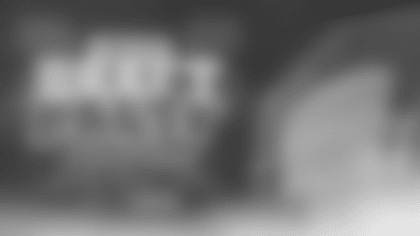Questions and answers with Colts Head Coach Jim Caldwell .
. .
Question: You are five games into your first season as the Colts' head coach. Are you getting more comfortable with it, or is it a case where you were never really "uncomfortable?"
Answer: I'm comfortable with the routine. I'm comfortable with the pace of it. I'm comfortable with the demands. (Laughing) First of all, I didn't prepare lightly for it. I keep a very detailed notebook and always have. I put everything in order: 'This is what I need to do this day. This is what I need to do when . . . so on and so forth.' So, I've always done that. Anytime I get involved in an endeavor, I put together a daily checklist. I have my Bible reading, when I work out, right down the line, everything that I do. I put those things in sequence. Number one, what it helps me do is I stay organized that way. Number two, I don't forget anything and if there's something that pops up I say, 'Well, on this day, I better start doing this and I add it to my list.' I've always done that through my whole life. Every stop that I made in coaching in a particular area, I can show you what I did at that stop, how I did it, how I organized it, how I did my teaching. I did the same thing about what I taught, what film. I had one I utilized here that I put together time sequence, practice, so on and so forth. I had that in place. So, a while back I went to (Colts Head Coach assistant) Jackie (Cook) and said, 'Jackie, tell me the things (former Head Coach) Tony (Dungy) does during the course of a week.' That was about three or four years ago – or maybe before that. It was before my first interview, and I had my head coaching schedule put in place, and then I tweaked it. I fit one exactly for this setting. I asked Jackie, 'What does he do on this day? What are the demands?' So when it all came to fruition, I had a good game plan of how I wanted to function. So, I don't want to give the impression that I'm cocky or anything like that, but I worked to try to get to the point where I could eliminate mistakes by being prepared. That's kind of what helped me get settled and helped me get to the point where I could anticipate issues, problems, demands and responsibilities.
Q: People always ask, 'What are the differences between Jim Caldwell and his predecessor, Tony Dungy?' There are similarities, but having coached under legends such as Joe Paterno, are you perhaps a bit more old school?
A: I'm probably a bit more traditional. I think so. I try to measure my words. If I can, I try not to leave a whole lot of things to interpretation. Kind of cut and dry, if I can, but I'm honest with the media. I never want to feel I have to go in there and take something back that I said that wasn't quite accurate. I spent years in the college ranks. That's kind of where I cut my teeth, where Tony was the antithesis of that. He cut his teeth in this league. His experience is a lot different than mine. In college, you have to be a little more in a position of control. And you have to be mindful of what you said and when you said it in those settings. I probably grew up a little differently professionally in that sense.
Q: Let's go on the field a bit. You are 5-0, but what are you pleased with the most thus far?
A: I'll tell you what I like most about this team: they know how to practice. They know how to practice, and they know how to prepare. And when you know how to practice and how to prepare, that's such a big part of performing well. That's such a big part of winning that people really underestimate. To me, that's the key to success. I believe in preparation, as you know. I believe that may be kind of the essence of my professional life. This team has a real good sense of that. I don't take that for granted and if things aren't going well in certain situations you'll see a veteran step up and say, 'Hey, listen guys. Let's get this thing straightened out.' It doesn't take very long. It's not like they're going to let it go by two or three plays. They're engaged and right in the thick of it. That, probably more so than anything else, is the thing I appreciate, because that, I think, has as much to do with our success as anything.
Q: Almost at every position, there's a veteran. Is that a reason for that element you discussed? Reggie Wayne, for example, is there at the receiver position with a lot of young guys . . .
A: He sets a great tone. So, he's the bell cow and everybody else at that position looks to him to kind of see what he does and how he does it. He sets a great example. Think about the antithesis of that – that you have the bell cow who doesn't want to practice. Now, what do you do? That's the kind of tone he's setting and now you have younger guys looking to that player and saying, 'I can get to his level of play, but I don't necessarily have to work as hard in practice and get there.' That's the opposite of what we've always believed in here. When you see the really fine players, those guys buy into the process of preparing. We're fortunate that we have great leaders who believe in the process of preparation.
Q: This has been another year where 'Next Man Up' has really paid off for the Colts. There have been many cases this season of reserves playing key roles when asked to start. Under Dungy, that was something that permeated the organization and it seems to be the same now . . .
A: It's just the way we are, and there's no question about it – it is a mindset. It's a mindset that you don't buy into thinking one person's down and it's going to affect the outcome of a game. You hear a lot of people bellyaching about having two rookie corners playing or, 'This person's not playing and we're going to be a little short here' – that never even enters the equation for a couple of different reasons. I think when you talk about it and bring attention to it, all of a sudden you kind of diminish the role of that person stepping into take over. Now, all of a sudden he thinks, 'Oh, I'm just a substitute and before long, the guy who starts here is going to be back and they don't think I'm quite as good and etcetera.' We expect them to come in and play as well as anybody else who ever played the position. We encourage them to do so, and we treat them like that. We don't come in and minimize their contribution to our team. We try to maximize every individual who performs for us. . . . Good teams can go anywhere and play and play well if they believe they can. The minute you start chipping away with, 'If we were healthy; we're not healthy; etc.' it's going to affect you. It certainly makes a huge difference when you start coming up with excuses for not performing well. It's a recipe for disaster.
Q: The defense has made some pretty drastic improvements . . .
A: It's a work in progress, but I do think (first-year defensive coordinator) Larry (Coyer) is doing a tremendous job of getting everybody on the same page in terms of how we want things done. I do think the players have bought into the system. It's basically still the same, but we have a lot of little nuances we're stressing. We stunt just a little bit more, and I think that's been something they've enjoyed doing. They feel they get an opunity to get after the opposition a little bit more. I think we're becoming a little bit better tackling team, too, and that has to do with something that always has been here – that we've been a team that always has been able to run to the ball and use our speed. I think that's still evident, and it always has been kind of a hallmark of ours. We're built on speed.
Q: Tackling – that was something you emphasized after the Miami game.
A: Because that was literally the issue. We were in a position to make plays and get off the field on third down, and things of that nature. We just didn't tackle very well. They have bought into the fact that we can stop the run and that we can control our gaps. We've been able to do that against some pretty strong running teams here of late.
Q: You are starting to hear the question, 'What are they going to do when (wide receiver) Anthony Gonzalez comes back?' Pierre Garcon and Austin Collie have played well enough that it's an obvious question . . .
A: We had Reggie (Wayne), Marvin (Harrison), (Brandon) Stokley and Dallas (Clark) a few years ago. That's pretty good. That's a good problem. That's not an issue.
Q: Even beyond the record, it is obvious you feel good about this team right now . . . Even if you were 3-2, you would feel good . . .
A: I would, because I would know at some point in time it was going to turn around if we work the way we work and prepare the way we prepare. My old basketball coach used to say, 'The cream will always rise to the top.' I believe that, that at some point in time it's going to turn for you. That's why I feel good about this team. I know that, at some point in time, there are going to be some downturns. Now, sometimes those are within the games, and we've experienced that. Sunday night, for example (at Tennessee), we got in some tough situations – after the fumbled punt – and the defense came out and held them to three points. We had an interception they returned inside our 40-yard line. We held them again to three points. Those were situations where things were tough, but because of the way in which they prepare and how they fight – we came out of those situations ahead 7-6, and we had two huge turnovers. They turn it over and we got seven points. We could have been down 14-7, but the way the guys hang in, fight, work – they can battle through.
Q: You are 5-0, but you do not get the impression from speaking with you that you put much thought into your team's record . . .
A: I'm trying to focus in on St. Louis. I think that's always been a good problem I've had. That's how life always has been for me. We won a national championship at Penn State. I remember after the game was over, we were all hugging each other on the field. My wife brought our four kids. They're running toward me. I try to scoop them all up and we're having a good time. It was just a great atmosphere. We go to the locker room together as a team, high-fiving each other, and within 45 minutes I was outside on a pay phone calling my recruits, because as I was changing my clothes I was thinking, 'You know what? It has been a week I've been away from my guys.' I had already jumped into my work mode, because winning always has been such a fleeting experience that I know it doesn't last long, and you better start looking forward trying to do it all over again. That's kind of how I've always been: 'Let's go on to the next one.' But I'm the same way with a loss. There's nothing I can do about it. After it's over with, it's over with. 'Let's see how we can get better. Let's see how we can go on and move to the next one.' I think that's one of the things that keeps me moving forward.














